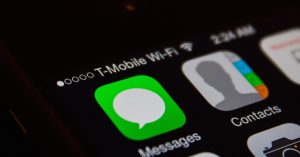
On Monday, T-Mobile chief executive John Legere issued an ultimatum for a small percentage of the service’s data abusers: Cut it out or we’ll kick you out.
In an open letter published on T-Mobile’s website, Legere targeted a small number of customers who have been circumventing restrictions on the company’s data services in order to download a large amount of Internet services and content.
T-Mobile is one of the last wireless phone companies to offer its users an all-you-can-eat, or “unlimited,” data plan for smartphones. One perk of T-Mobile’s data plans is that users can connect their tablets, laptops and other devices to their smartphones — a practice known as “tethering” — allowing other devices to essentially piggyback off T-Mobile’s data network.
For most of T-Mobile’s data plans, the amount of data one is allowed to use through tethering is equal to the amount of data a customer pays to use on their phone, and that data is treated equally. On unlimited plans, though, T-Mobile caps the amount of tetherable data to 7 gigabytes — the equivalent of seven one-hour high-definition TV shows streamed over Netflix.
Most of T-Mobile’s users abide by the company’s request, using tetherable data the way it was intended — connecting a Wifi-only device to a phone, sending a quick e-mail from a coffee shop, or temporarily helping out a friend on another network who might not have a data connection.
But some, Legere noted, have been abusing T-Mobile’s unlimited data service, circumventing restrictions on their phones and on the company’s network to download and stream an absurdly large amount of content — in some cases, as much as 2 terabytes worth of data, or the equivalent of 1,000 high-definition movies, every month.
Legere noted that the number of abusers didn’t represent a large amount of T-Mobile’s customer base — just 1/100th of one percent of T-Mobile’s 59 million customers, or around 3,000 phone subscribers, Legere said — but the abuse has become so problematic for the company that the chief executive felt the need to address it in an open letter.
There could be any number of reasons why Legere chose to go public with his concern rather than simply directing T-Mobile’s customer service agents to send warning letters to subscribers: Legere may have wanted to get in front of the issue before it became a larger one, or the company may have wanted to avoid the bad publicity that sometimes accompanies warning letters sent to subscribers who use copious amounts of supposedly “unlimited” data (to be fair, T-Mobile clearly advertises the difference between unlimited phone and not-unlimited tether able data, and customers are generally supposed to understand the difference between the two).
But Legere’s letter may also have an unintended — but positive — consequence in that it recognizes the limitations of a wireless company as a broadband Internet provider.
Even though most home Internet users have just one or two choices for broadband Internet — usually AT&T, Comcast, Time Warner Cable, or some other large company — traditional wireline broadband Internet service providers have tried to use wireless phone companies like T-Mobile and Sprint as proof that consumers have a multitude of choices for broadband Internet service.
Last year, in a letter filed as part of ongoing regulatory considerations for a proposed merger, Comcast Corporation asserted its Internet competition included “fixed wireless providers. Other broadband Internet companies have made similar arguments in an attempt to monopolize the home Internet space or for any other number of reasons.
Ask any regular consumer and they’ll tell you that accessing the Internet from a wireline broadband Internet company like Comcast or AT&T is a very different experience from accessing the Internet on a smartphone connected to a wireless data service provider like T-Mobile or Verizon. But lawmakers and regulators often overlook this experience difference because, on paper, an Internet service is an Internet service.
Except now, the head of one of America’s largest wireless phone companies is saying exactly the opposite: T-Mobile is not the same as your home Internet, Legere asserts, and using it as such severely impacts the experience of other customers on the network. In fact, Legere writes, if T-Mobile doesn’t immediately address the issue of tethering data theft, it could “jeopardize” the company’s plans to continue rolling out broadband service to other parts of the country, something that could “eventually have a negative effect on the experience of honest T-Mobile customers.”
That distinction effectively ends any argument that supports the idea that all broadband services are created equally, and — much to the chagrin of the legacy wireline broadband service operators — that wireless is a suitable competitor to their offerings. Perhaps in 25, 10 or even five years we’ll be in a position to say otherwise. But we aren’t there yet. So says the man himself.
